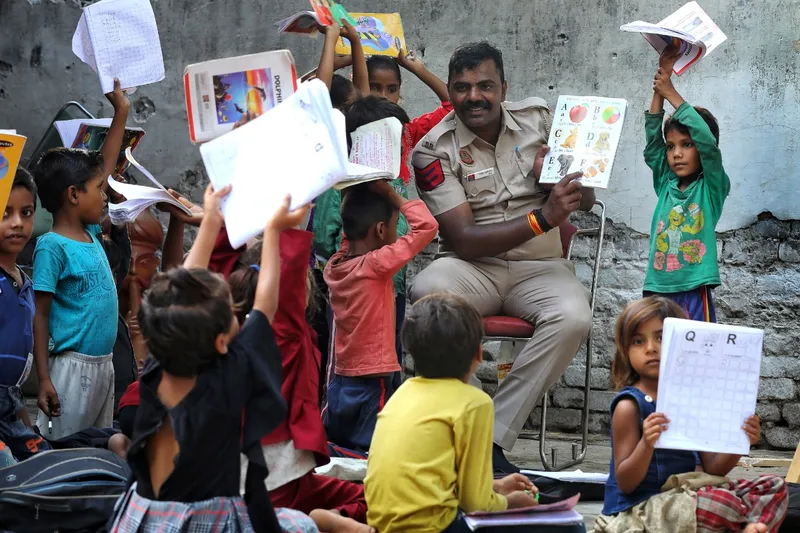This constable is educating underprivileged children to rescue them from crime and labour
Than Singh is a Delhi-based police constable who started pathshala in 2015 with four children. Now he has 80 students to whom he teaches alphabets, names of the days and months, numbers, and other such simple things.
“Ma’am ji, my name is Ravi. Earlier, I had never gone to school, but now I study in class 7,” says the 14-year-old boy from Delhi to SocialStory.
Before joining school in 2021. Ravi used to accompany his parents who worked as labourers near Red Fort in Delhi. He used to do the menial work and loiter around the whole day. However, three years ago, his life changed when he met Than Singh, a police constable who was providing free education to such kids in the same area.
Ravi now goes to school regularly, setting off early in the morning. After finishing school around 2 PM, he heads straight to 'Than Singh ki Pathshala' without skipping a day.
“Than Singh uncle did a lot for me and kids like me. I also want to become like uncle after I grow up,” he says.
Like Ravi, 80 more children from different age groups who used to be involved in odd jobs like rag picking, begging, and loitering around the whole day and ignoring their education, are now studying, and 75 of them are getting formal education.
Based in Delhi, Than Singh started this pathshala in 2015 with four children. He is now educating 80 students, all of whom belong to underprivileged backgrounds, and whose parents don’t have enough money to send them to school.
“The aim is to provide such kids with education and make them competent enough for school. Additionally, I wish to prevent them from getting into the world of crimes by instilling good behaviour among them through education,” says Singh.
Personal struggles

Than Singh
Than Sigh, who hails from Bharatpur, Rajasthan, shifted to Delhi after his birth. Singh’s father always dreamt of joining the police services. But due to their financial circumstance, he could never fulfil his dream.
However, he wanted Singh to join defence forces when he grew up. Singh knew that to fulfil his father’s dream, he had to complete his education. He started helping his father who ironed clothes for a living and attended his school as well. After he completed his schooling, he started to sell corn alongside helping his father in his daily chores to meet the growing expenses of his education.
“I lived in a slum area in Meera Bagh and I have seen dire financial circumstances. While growing up, I always wanted to do something for children like me, but back then I had no idea,” he says.
After juggling work and studies for years, Singh cleared the examination for Delhi Police constable in 2010, after two attempts.
Helping underprivileged children
While he was posted near Red Fort, he noticed many young children who accompanied their parents who worked as labourers, and did menial tasks all day. As such when he talked to their parents, Singh got to know that none of them had enough money to send their children to school.
To provide a solution, he founded Than Singh ki Pathshala. Singh knew that straight away enrolling them in schools would not be a good option as these children had never received formal education.
“When seeking admission for a 12-year-old at a school, the ideal placement would be in either Class 6 or 7. For this, they should at least have some basic skills like reading or at least they should be familiar with alphabets. But these children had no prior exposure to formal education, making it impractical for them to be enrolled," he explains.
Singh also adds that many of these children used to eat gutka (tobacco) and were very prone to getting into the world of crime.
Nevertheless, his path has been far from smooth. He shares that many young children do odd jobs to earn small amounts and contribute to their households. This occasionally led to parents hesitating to send their children to school, as they were concerned about losing this additional income.
“I used to explain to them the importance of getting educated. Though it was tough, they used to agree after seeing a police officer,” he adds.
Breaking the chain of poverty and crime through education
Singh teaches more than 80 children from Raj Ghat, Vijay Ghat, Shantivan, Red Fort, and Lohe-wala-pul (Old Yamuna Bridge). He conducts classes from 3 pm to 5.30 pm every day and teaches alphabets, names of the days and months, numbers, and other such simple things. Children ranging from 1st to 8th grade participate in the class.
Singh says, with the help of DCP Sagar Khalsi, he was able to enroll nearly 70 kids in government-run schools last year. “These children have started going to school, but they come to us to clear their doubts. This helps them excel in their studies and ensure they don't lag behind their classmates. Also, ten of my children have topped their class,” he says.

Than Singh teaching children near Red Fort
So far, Singh has 50 volunteers and three full-time teachers. “If you do good work, people will come forward for help. As such, we get everything through donations–from food, uniforms, books,” Singh adds. He further explains that if he does not receive any help from outside then he uses a portion of his own salary to meet the needs.
The nearby gurudwara provides langar every day to the pathshala. Alongside, some e-rickshaw walas working in the area decided to pick up and drop off children coming from far-off areas for free.
Singh adds that he has made a personal bond with each child, and every time one of them does not come to class for few days, he personally visits them to check on them.
“These children want to study, but cannot because of their financial constraints. So, I want to help them in getting educated so they can break the chain of poverty and aspire big,” he says.
Singh plans to continue these classes and help as many children as possible.
Edited by Megha Reddy







